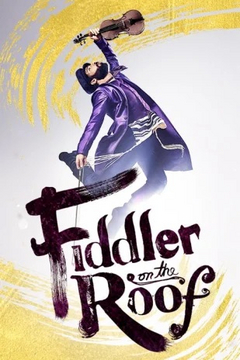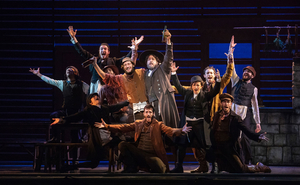Review: FIDDLER ON THE ROOF Successfully Continues the 'Tradition' at Music Hall At Fair Park

|
|

Since its premiere in 1964, Fiddler on the Roof has become a tradition unto itself, a common force that unites audiences and performers from across the decades and across all walks of life, from St. Louis to Syria to Siberia. The musical has been revived on Broadway an astounding five times, and a new Yiddish translation of the show premiered Off-Broadway to rave reviews earlier this year. Now, the touring production of the most recent 2016 revival of FIDDLER has pulled Tevye the dairyman and his milkcart to Dallas, performing at the Music Hall at Fair Park through August 18. The production also runs at Bass Performance Hall in Fort Worth from August 20-25.
As ubiquitous as the musical has become, however, this current production makes a compelling argument for the freshness and timelessness of FIDDLER and its message. Under the original direction of Bartlett Sher, performers and designers fill every scene and musical number with a renewed sense of urgency, determined to show that the forces that worked upon Tevye's family and his tight-knit community are still very much hard at work all these decades later.
For those who may have somehow missed the cultural phenomenon that is FIDDLER, the musical tells the story of Tevye, a poor dairyman; his wife, Golde; and their five (five!) daughters. They live in the small Jewish shtetl of Anatevka in rural Russia at the dawn of the twentieth century. At first, Tevye only seems concerned with how best to handle his daughters' desires to break tradition and marry men that they have chosen for themselves rather than waiting to receive their father's blessing first. Soon, these family matters seem like trifles as the tsar's insidious designs draw closer and closer to home and threaten to rip out tradition by its roots.
This new production is perhaps the most visceral presentation of this material that audiences are likely to see anytime soon. The entire cast speaks and moves with such deliberate conviction that every song and dance feel like a prayer. Under the music direction of Michael Uselmann, their voices blend in hauntingly harmonious ways, softly flowing forth during the solemn "Sabbath Prayer" and crashing like waves over the audience in the raucous celebration "To Life." Furthermore, they execute Hofesh Shechter's sharp yet frenzied choreography with both passion and precision, giving the musical's extended dance breaks a feeling of spontaneity and uncontrollable mirth.
Leading the charge as Tevye, Yehezkel Lazarov - the Israeli star of stage and screen - leads audiences into territory both familiar and unfamiliar with his charisma, charming with his easygoing good humor while still maintaining a bearing of strength and power that can onlycome from being the sole provider for a hungry family. Lazarov's best qualities are too numerous to list in a short review, but perhaps most impressive of all is that his sense of comedic timing and delivery are nothing short of brilliant. His funniest moments, whether they be his direct addresses to God or a rapid-fire exchange of insults between neighbors, are reminiscent of some of the biggest names in Jewish comedy, from Groucho Marx to Mel Brooks. While Lazarov's dialogue provoked wild laughter in the audience, his singing brought the crowd to an attentive silence through every note. Classic numbers such as "If I Were a Rich Man" and "Sunrise, Sunset" showcased the actor's ability to sing with both technical finesse and real raw emotion, and all of his solos received immensely appreciative applause on opening night.
Maite Uzal provides a suitable match for Lazarov as Tevye's wife, Golde. More rigidly strict than her male counterpart, Uzal brings a warmth and vulnerability that complicates the character. Rather than fulfilling the stereotypical archetype of the nagging housewife, Uzal's Golde is hard because life has been hard to her, which makes the moments where she accidentally shows her hidden emotions all the more powerful. Her second act duet with Lazarov in "Do You Love Me?" is a tour-de-force performance that allows both actors to blend humor with humility, crafting a bittersweet song that leads to both tears and laughter.
Mel Weyn, Ruthy Froch, and Natalie Powers delightfully revel in the stirrings of youthful rebellion as Tevye and Golde's three eldest daughters: Tzeitel, Hodel, and Chava, respectively. It is a fault of a script that the three young women are not better differentiated at first, but all three actresses build dynamic personalities that soon set them apart from one another. Weyn's respectful yet determined Tzeital balances her deep love for her family with her desperate desire to marry the man she loves, Motel (Jesse Weil). Froch's Hodel moves about the stage with an upright confidence, a woman who knows what she wants and how she plans to get it, while Powers plays Chava with the naïve innocence of a young girl who does not know where her choices will lead her. The three daughters unfortunately do not have many songs to themselves, but their playful take on "Matchmaker, Matchmaker" is wonderfully delightful and a stark contrast to how the women will relate to each other by the end of the show.
The remainder of the ensemble is filled with wonderfully entertaining character actors of all types, though it is worth mentioning at least a handful of the more memorable performances. Weil skillfully walks a fine line between humor and heart as Motel, and his energetic movements about the wide expanse of the stage are only matched by his exuberant love for Tzeital. Ryne Nardecchia is captivating as Perchik, a student and ardent communist who falls in love with Hodel. Perchik was never a character that has really stood out to me, but Nardecchia paints a complicated portrait of his role, one that puts the passions of the mind into direct conflict with the passions of the heart. Jonathan Von Mering's physical bearing and rumbling voice make for an intimidating Lazar Wolf, and Olivia Gjurich makes an unforgettable appearance as Wolf's deceased first wife, Fruma-Sarah.
FIDDLER ON THE ROOF and all of its beloved and loving characters arrive just in time to ask audiences questions that ought to always be on our minds but that we too often forget. What is the nature of a community? When does tradition stand in the way of progress? What would you do if a neighbor were in trouble, even if that neighbor were a stranger? Tevye may not be a perfect man, but he recognizes that it is far more important to be a good man than a perfect one, a man who keeps moving forward rather than always looking back. Perhaps we would be wise to make his habits a new tradition of our own.
Add Your Comment
Join Team BroadwayWorld
Are you an avid theatergoer? We're looking for people like you to share your thoughts and insights with our readers. Team BroadwayWorld members get access to shows to review, conduct interviews with artists, and the opportunity to meet and network with fellow theatre lovers and arts workers.
Interested? Learn more here.
Videos
